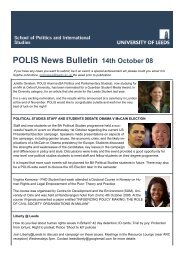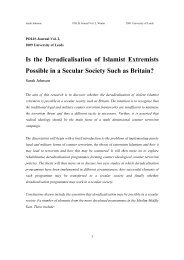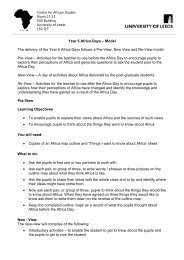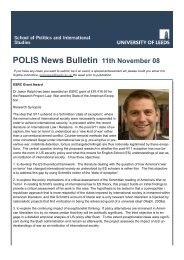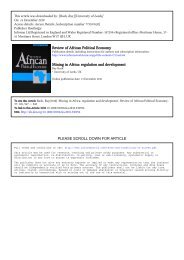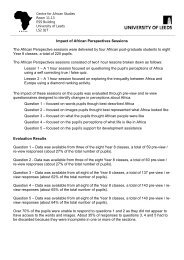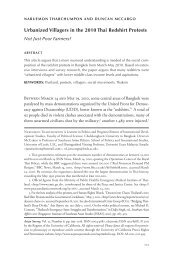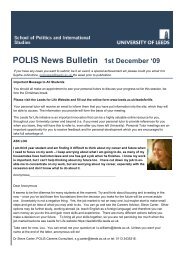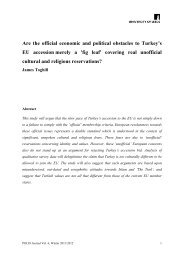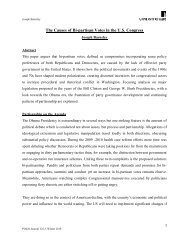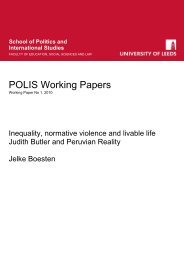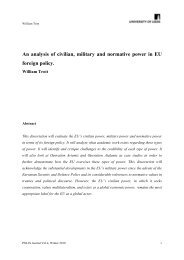Japan's Political Tsunami: What's Media Got to Do with It?
Japan's Political Tsunami: What's Media Got to Do with It?
Japan's Political Tsunami: What's Media Got to Do with It?
You also want an ePaper? Increase the reach of your titles
YUMPU automatically turns print PDFs into web optimized ePapers that Google loves.
The International Journal of Press/Politics OnlineFirst, published on February 17, 2010 asdoi:10.1177/1940161210361588Japan’s <strong>Political</strong> <strong>Tsunami</strong>:What’s <strong>Media</strong> <strong>Got</strong> <strong>to</strong><strong>Do</strong> <strong>with</strong> <strong>It</strong>?The International Journal of Press/PoliticsXX(X) 1 –10© 2010 SAGE PublicationsReprints and permission: http://www.sagepub.com/journalsPermissions.navDOI: 10.1177/1940161210361588http://ijpp.sagepub.comDuncan McCargo 1 and Lee Hyon-SukAbstractThis article reviews media-related aspects of the 2009 Japanese lower house elections,which saw the his<strong>to</strong>ric defeat of the long-ruling Liberal Democratic Party by theDemocratic Party of Japan (DPJ). Drawing mainly on Internet sources and on interviews<strong>with</strong> politicians and political journalists, the authors argue that the DPJ relied primarilyon conventional media strategies and made only limited use of new media in theircampaign. If the DPJ hopes permanently <strong>to</strong> transform Japan’s political landscape, theparty will need <strong>to</strong> prioritize the reform of outdated election campaign legislation andabolish “closed shop” reporters’ clubs.Keywordselections, new media, television news, reporters’ clubs, JapanJapan’s August 30, 2009, lower house elections marked one of the most dramaticmoments in the country’s postwar political his<strong>to</strong>ry. After ruling Japan almost continuouslysince 1955, the Liberal Democratic Party (LDP) was ousted from power in aballot-box landslide. The opposition Democratic Party of Japan (DPJ) <strong>to</strong>ok 308 seats<strong>to</strong> the LDP’s 119, a near-exact reversal of the previous election results in 2005 (whichhad seen the LDP win 304 seats <strong>to</strong> the DPJ’s 113). The LDP’s share of the popularvote collapsed <strong>to</strong> 26.7 percent versus the DPJ’s 42.4 percent. Voter turnout exceeded69 percent, the highest for nearly two decades. For the first time, the Japanese publichad given a clear mandate <strong>to</strong> an alternative administration. The LDP had presidedover Japan’s remarkable postwar reconstruction and transformation <strong>with</strong> amazingsuccess but in recent decades had become mired in recurrent scandals and a sclerotic1 University of Leeds, UKCorresponding Author:Duncan McCargo, School of Politics and International Studies, University of Leeds, Leeds LS2 9JT, UKEmail: d.j.mccargo@leeds.ac.uk
McCargo and Lee 5was like a samurai princess fighting a big lord. In spite of being a woman, shewas so brave <strong>to</strong> fight against this big evil thing. 12The irony is that despite criticizing the media for not taking women candidatessufficiently seriously, Tanioka also acknowledged that some of them were selectedpartly for their looks. And for all the DPJ rhe<strong>to</strong>ric about empowering women, the newadministration appointed only two female ministers. 13 As a new party <strong>with</strong> relativelylittle his<strong>to</strong>ry or cumbersome political baggage, it was relatively easy for the DPJ <strong>to</strong> putup fresh-faced, younger candidates from a variety of backgrounds, so wrong-footing theLDP. 14A third element in the election outcome was the way in which the DPJ was ablesuccessfully <strong>to</strong> exploit widespread political dissatisfaction among the Japanese public,a theme that was highlighted in Ha<strong>to</strong>yama’s statement of principles issued right afterhe became prime minister:I have taken the view that the recent general election was not a triumph for onlythe DPJ and its allied parties. Rather, the public’s unbearable distrust of politics,their dismay at the dysfunction of conventional politics and the government aswell as their pronounced anger at this situation, were reflected in the high voterturnout rate and led <strong>to</strong> a change of government. 15While Ha<strong>to</strong>yama put a positive spin on the situation, arguing that his government wasaiming <strong>to</strong> create a “new nation” based on shared ideals, DPJ House of Councillorsmember Shin-kun Haku suggested that the election results reflected an explosion offrustration against the LDP’s outmoded politics, and especially the party’s widespreadpractice of inherited parliamentary seats, passed down from father <strong>to</strong> son. 16 Hakuargued that the very same voters who had supported Koizumi’s plans <strong>to</strong> reform theLDP in 2005 rallied around the DPJ’s calls for “regime change” (seiken kotai) in 2009.Nevertheless, veteran Asahi Shimbun political journalist Hiroshi Hoshi arguedthat the DPJ’s approach <strong>to</strong> the campaign did not really amount <strong>to</strong> a particular mediastrategy. 17 From Hoshi’s perspective, the DPJ was trying <strong>to</strong> avoid the impression ofsuccumbing <strong>to</strong> the kind of hyped-up, media-focused election campaign waged byKoizumi in 2005. Most Japanese print journalists regard the idea of a media-drivenelection campaign <strong>with</strong> a certain disdain, preferring <strong>to</strong> argue that elections werefought on substantive political issues. While offering a well-informed view based onconsiderable inside knowledge, Hoshi tends <strong>to</strong> play down the very real salience ofpolitical marketing techniques in helping shape Japanese elec<strong>to</strong>ral outcomes. But acomparable view was expressed by Tobias Harris, an influential American commenta<strong>to</strong>ron Japanese politics and a former DPJ aide. Harris argued that the DPJ “hasbeen generally poor at political communications” and went on <strong>to</strong> say,The DPJ has had so much help from the LDP over the past several years that ithas had <strong>to</strong> do relatively little communicating of its own in order <strong>to</strong> put itself ina position <strong>to</strong> win. 18
McCargo and Lee 7where popular entertainment stars routinely post the most trivial details about theirmeals and pets. DPJ Diet member Ikuo Yamahana, who blogs himself, did not believethat political blogs created any “big waves” among Japan’s elec<strong>to</strong>rate. 24In 2009, the LDP tried <strong>to</strong> use Internet video technology for campaign purposes,while the DPJ experimented <strong>with</strong> mobile phone games and other content. Some politiciansposted video clips at Nico Nico <strong>Do</strong>uga, or “Nico-<strong>Do</strong>u” (www.nicovideo.jp), aJapanese variant on YouTube. Some of these moves were counterproductive: Negativeonline campaigning by the LDP actually alienated some younger voters, who foundthe attacks ugly and childish. 25 Attempts <strong>to</strong> mimic Western campaign techniquessimply backfired when tried out on Japanese voters. Another new development wasthe creation of a political donation site known as Love Japan, by the leading Internetcompany Rakuten. 26 More than seventy politicians, including forty from the DPJ,registered at the site <strong>to</strong> receive credit card donations (minimum donation 1,000 yen, oraround $10) from individual supporters. Such innovations mark the tentative beginningsof a new role for electronic media in politics. For now, however, the extremelyrestrictive Public Offices Election Law tightly limits activities that could be construedas election campaigning, including barring candidates from using blogs, Twitter, orother electronic media during election campaigns. Some politicians sought <strong>to</strong> circumventthe law by resorting <strong>to</strong> pseudo-campaign activities that did not constitute realelectioneering. 27 While in opposition, the DPJ had pledged <strong>to</strong> amend these electionlaws, arguing that they were biased in favor of the incumbent LDP. Legislative changescoupled <strong>with</strong> greater social acceptability of political blogging could gradually open upnew modes of campaigning in future.The dominance of the “Big 5” newspaper groups in Japan was part-and-parcel of theLDP-led “1955 system,” which supported cozy and collusive relationships between thepolitical and business elites. These newspaper groups now face a number of challenges.The first concerns declining profitability and reduced circulations: in developmentsthat parallel changes in Europe and North America, more and more Japanese arereading news primarily on their cell phones and are canceling their long-standing printsubscriptions. The DPJ came <strong>to</strong> power pledging <strong>to</strong> abolish the kisha club system andopen up press conferences <strong>to</strong> foreigners, freelancers, and new media. In practice, theirattempts <strong>to</strong> liberalize the reporters’ clubs have met <strong>with</strong> limited success. ShizukaKamei, minister of financial services, was quickly forced <strong>to</strong> hold two separate back-<strong>to</strong>backbiweekly news conferences, a <strong>to</strong>ken formal meeting for the kisha club and asecond, more relaxed Webcast for other journalists. 28 Japan’s major news media madelittle or no reference <strong>to</strong> the ongoing kisha club wars; the DPJ had only changed pressaccess <strong>to</strong> four major ministries and agencies and did not immediately deliver on a campaignpledge <strong>to</strong> open up the prime minister’s press conferences. Writing in the outspokenbiweekly news magazine SAPIO, Uesugi Takashi declared that the system was at theroot of the lack of effective competition in the Japanese media: “Without opening upthe kisha club system, there is no future for Japanese journalism.” 29 Freelance writer YuTerawasa has argued that the DPJ is quietly reneging on its promises <strong>to</strong> break open thekisha clubs, revealing the continuing stranglehold on power and information exercised
8 The International Journal of Press/Politics XX(X)by the bureaucracy. 30 An acid test for the new government was how far the DPJ couldprogress <strong>with</strong> dismantling both the reporters’ clubs and the closed-door political culturethey epi<strong>to</strong>mized.As Shin-kun Haku persuasively argues, despite recent technological innovations,Japan remains largely an “analog” society, where personal contacts and connectionstrump other forms of campaigning. 31 In terms of media, television remains the keycampaign ground. The DPJ has been able <strong>to</strong> exploit the wideshow daytime TV programmingthat Koizumi had previously made his own. But if the DPJ hopes <strong>to</strong> retainpower beyond its present parliamentary term, the new government needs <strong>to</strong> press ahead<strong>with</strong> media reforms including revision of the election laws and a ruthless purge of thekisha clubs. As Columbia University’s Gerald Curtis has pointed out, the strong LDPshowing in 2005 and correspondingly impressive DPJ performance in 2009 illustratesthat neither party has a robust political base. 32 Valence issues, media strategies, and newmodes of campaigning could sway voters decisively next time—and unless the DPJgets a firm grip, the possibility of a rapid reversion <strong>to</strong> LDP rule remains very real.The Japanese case may give pause for thought <strong>to</strong> those who see the inexorable riseof new media as central <strong>to</strong> elec<strong>to</strong>ral outcomes and the birth of alternative regimes. TheDPJ ousted the LDP partly through the use of mainstream media, especially television.But blogging and the Internet played little role in the LDP’s defeat: The world remainsrather more analog than many media specialists would like <strong>to</strong> believe. Even inapparently high-tech societies such as Japan, most people still cast their ballots forold-fashioned, low-tech reasons, such as disappointment <strong>with</strong> uninspiring incumbents,the emergence of more attractive and sympathetic candidates, and a well-craftedelection manifes<strong>to</strong> advocating a specific program of positive policy changes. Furtherresearch is urgently needed on Japan’s fast-changing political blogosphere, whilethose working on other political systems might be wary of letting their personalenthusiasm for new media drive their arguments and conclusions.AcknowledgmentsThe authors wish <strong>to</strong> thank those who kindly granted interviews for this article, all of which wereconducted in Japanese by the second author.Declaration of Conflicting InterestsThe authors declared no conflicts of interest <strong>with</strong> respect <strong>to</strong> the authorship and/or publicationof this article.FundingThe authors received no financial support for the research and/or authorship of this article.Notes1. According <strong>to</strong> an online survey, 65.9 percent of respondents cited talk shows as a source ofinformation for decisions concerning politics. This compared <strong>with</strong> 50.5 percent for commercialTV news broadcasts, 49 percent for NHK TV news, and 22.5 percent for NHK’s
McCargo and Lee 9political affairs programs (Nikkei Sangyo Shimbun, Oct. 9, 2003, cited in “Japan—<strong>Media</strong>Environment Open, State Looms Large,” Open Source Center, <strong>Media</strong> Aid, Aug. 18, 2009,http://www.fas.org/irp/dni/osc/japan-media.pdf (accessed Jan. 6, 2010). Rudimentarytranslations of all Japanese Web sites cited in this article may be obtained via the GoogleToolbar. Japanese names have been given here Western-style (family name second) ratherthan Japanese-style (family name first).2. On June 30, 2006, just before Koizumi stepped down as prime minister, then–U.S.President George W. Bush <strong>to</strong>ok him on Air Force One for an official visit <strong>to</strong> Elvis’sGraceland mansion.3. Noriko Hama, “Taro Aso: The Millionaire Slumdog,” openDemocracy, March 10, 2009,http:www.opendemocracy.net (accessed Jan. 6, 2010).4. See Reiji Yoshida, “Manga Fans Have Been Won Over but What about the Rest of Japan?”The Japan Times, Sep. 23, 2008, http://search.japantimes.co.jp/cgi-bin/nn20080923a6.html.5. For a discussion of 2channel, see Lisa Katayama, “2-Channel Gives Japan’s Famously QuietPeople a Mighty Voice,” Wired, Apr. 19, 2007, http://www.wired.com/culture/lifestyle/news/2007/04/2channel (accessed Jan. 6, 2010).6. Ikuo Yamahana, DPJ House of Representatives member, interview, Dec. 7, 2009. (His Website may be viewed at http://blog.livedoor.jp/yamahana190/ [accessed Jan. 6, 2010]).7. “Embarrassed Japan PM <strong>Do</strong>esn’t Know His Noodles,” AFP, Oct. 28, 2008.8. Tatsuyo I<strong>to</strong>, LDP, former minister of state for financial services and ex-Diet member,interview, Dec. 4, 2009 (Web site: http://www.tatsuyai<strong>to</strong>.com/ [accessed Jan. 6, 2010]).9. For an English translation of the manifes<strong>to</strong>, which lacks the images, see http://www.dpj.or.jp/english/manifes<strong>to</strong>/manifes<strong>to</strong>2009.pdf (accessed Jan. 6, 2010). For a PDF version in Japaneseincluding images, see http://www.dpj.or.jp/special/manifes<strong>to</strong>2009/pdf/manifes<strong>to</strong>_2009.pdf(accessed Jan. 6, 2010).10. J. Sean Curtin, “Female ‘Ninjas’ Steal Koizumi’s Limelight,” Asia Times Online, Sep. 23,2005, http://www.atimes.com/atimes/Japan/GI23Dh02.html (accessed Jan. 6, 2010). In the2005 election, the DPJ saw its women MPs reduced from fifteen <strong>to</strong> seven.11. Mariko Ka<strong>to</strong>, “Women Lack Confidence, Ambition for Diet: Experts,” Japan Times, Sep. 10,2009, http://search.japantimes.co.jp/cgi-bin/nn20090910f3.html (accessed Jan. 6, 2010).12. Catherine Makino, “Japan’s ‘Princess Corps’ Cracks the Glass Ceiling,” Inter Press Service,Asia Times Online, Sep. 11, 2009, http://www.atimes.com/atimes/Japan/KI11Dh01.html(accessed Jan. 6, 2010).13. These were Keiko Chiba, minister of justice, and Mizuho Fukushima, minister of state forconsumer affairs, food safety, social affairs and gender equality.14. Ikuo Yamahana, DPJ House of Representatives member, interview, Dec. 7, 2009.15. “Basic Principles of the Ha<strong>to</strong>yama Government,” statement issued Sep. 16, 2009, http://www.kantei.go.jp/foreign/ha<strong>to</strong>yama/statement/200909/16principles_e.html (accessedJan. 6, 2010).16. Interview <strong>with</strong> Shin-kun Haku, DPJ Upper House member, Dec. 11, 2009. (Haku’s Web sitemay be viewed at http://www.haku-s.net/index.html [accessed Jan. 6, 2010]).17. Hiroshi Hoshi, telephone interview, Nov. 30, 2009.18. Tobias Harris, “The DPJ Needs <strong>to</strong> Hone <strong>It</strong>s Message,” Inside Japan, Aug. 5, 2009, http://www.observingjapan.com/2009/08/dpj-needs-<strong>to</strong>-hone-its-message.html (accessed Jan. 6, 2010).
10 The International Journal of Press/Politics XX(X)19. Catherine Makino, “Voters Sceptical about Change,” Inter Press Service, Asia TimesOnline, Aug. 28, 2009, http://www.atimes.com/atimes/Japan/KH29Dh02.html (accessedJan. 6, 2010).20. For a discussion, see “Sankei’s Revealing Gaffe,” Observing Japan, Sep. 3, 2009, http://www.observingjapan.com/2009/09/sankeis-revealing-gaffe.html (accessed Jan. 6, 2010).21. One 2008 survey suggested that 59.5 percent of young adults access news through theirphones and just under 50 percent from computers. Around 70 percent of Japanese mobilephone contracts allow Web site viewing. See Japan—<strong>Media</strong> Environment Open (2009), 40,http://www.fas.org/irp/dni/osc/japan-media.pdf (accessed Jan. 6, 2010).22. Ibid., 37.23. For a sample article titled “Finally, the Nation of Japan Has Been Hijacked by the Trai<strong>to</strong>r, DPJ(South Korea, China, North Korea)!” see http://ameblo.jp/zuymymk/entry-10408520562.html (accessed Jan. 6, 2010). On the popular blog site Blogmura (http://www.blogmura.com/), blogs about dogs outnumber those about politics by more than a dozen <strong>to</strong> one.24. Ikuo Yamahana, DPJ House of Representatives member, interview, Dec. 7, 2009.25. Interview <strong>with</strong> Shin-kun Haku, DPJ Upper House member, Dec. 11, 2009.26. Love Japan is at http://seiji.rakuten.co.jp/ (accessed Jan. 6, 2010).27. Japan—<strong>Media</strong> Environment Open, 56.28. Martin Fackler, “New Leaders in Japan Seek <strong>to</strong> End Cosy Ties <strong>to</strong> Press Clubs,” New YorkTimes, Nov. 21, 2009.29. Uesugi Takashi, “Journalism wa kawaranakute iinoka?” [<strong>Do</strong>es Journalism Have <strong>to</strong> Change?],SAPIO (English subtitle “International Intelligence Magazine”), Nov. 11, 2009.30. Telephone interview <strong>with</strong> Yu Terasawa, Dec. 9, 2009.31. Interview <strong>with</strong> Shin-kun Haku, DPJ Upper House member, Dec. 11, 2009.32. Cited in Peter Alford, “A Body Politic in Need of Life Support,” The Weekend Australian,Sep. 5, 2009.ReferencesFarley, Maggie. 1996. “Japan’s Press and the Politics of Scandal.” In Politics and <strong>Media</strong> inJapan, ed. Ellis Krauss and Susan Pharr, 143–97. Honolulu: University of Hawaii Press.McCargo, Duncan. 2003. <strong>Media</strong> and Politics in Pacific Asia. London: Routledge.BiosDuncan McCargo is a professor in the School of Politics and International Studies, Universityof Leeds, UK.Lee Hyon-Suk is a Tokyo-based freelance researcher and interpreter.




